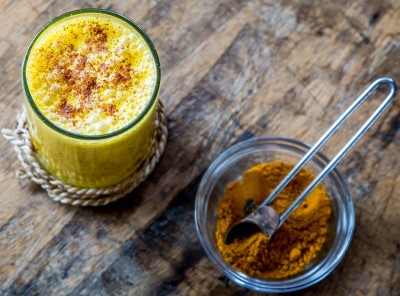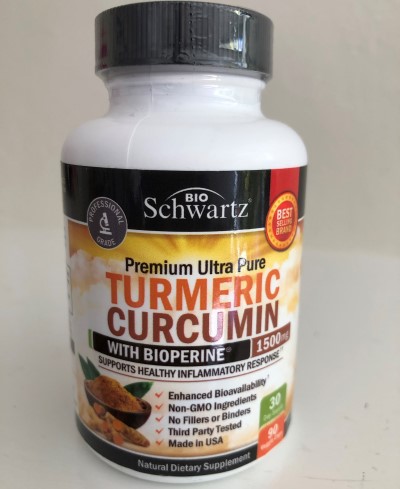
Turmeric for insomnia: What we know and 4 ways to try it
By Jason Wooden, PhD | April 11, 2021
While there’s no direct evidence that turmeric can cure insomnia, it’s anti-inflammatory effects may help with underlying issues for sleep such as stress, anxiety, inflammation, and chronic pain.
Another way it may help fight anxiety and depression is by boosting serotonin and dopamine levels. To try out turmeric, you can add it to your food, drink it in a tea or smoothie, or take a high potency turmeric supplement.
Why you’re thinking turmeric for insomnia instead of sleeping pills
The world has changed and there’s growing interest in natural remedies like turmeric for insomnia without the downsides of sleeping pills.
With one in three adults struggling with sleep every night, there’s a huge need for practical options.
While drugs may be useful as a short-term insomnia remedy, you may wake up the next morning with a sleeping pill hangover. Some people also have problems with memory and attention.
When used long-term, you may become dependent on sleeping pills and develop an addiction. (You learn more about this here.)
And for some people, those sleeping pills may stop working as the body builds up a tolerance to them.
So, you can see why people are looking for healthier alternatives.
Turmeric is known for its use in Indian curries and other middle eastern dishes. It’s certainly worth a look given its historic use in both traditional Indian and Chinese medical systems.
Curcumin is the main component of turmeric responsible for its well-known and powerful biological properties. It’s been used to help with ailments ranging from arthritis to heart disease.
It’s natural, no prescription is needed, and won’t comeback to bite you the way sleeping pills do.
Sounds too good to be true, right?
And it’s fair to ask can turmeric really help with insomnia?
Let’s take a look at what we know and how it can be used to improve sleep.
What turmeric does in the body
Before we get into the sleep benefits for turmeric, let’s look at it’s effects on the body.
As mentioned earlier, curcumin is the component of turmeric responsible for its anti-inflammatory benefits.
To be clear, inflammation is an important process. It’s how your body mobilizes to fight infection and helps the healing process.
However, too much inflammation for too long can actually harm the body. In fact, excessive inflammation has been found to play a role in many medical conditions including heart disease, diabetes, cancer, arthritis, and digestive disorders.
It turns out that curcumin has powerful antioxidant and anti-inflammatory properties.
And while more research needs to be done, early studies suggest it can help fight inflammation, pain, and heart disease.
So, that’s what it does in the body.
Let’s now look at what it could do for your sleep.
What the research says about turmeric and insomnia
Okay, whether turmeric can cure insomnia hasn’t been directly tested. (Basically, they haven’t given it to a bunch of people and tracked their sleep.)
However, turmeric might help with some of the underlying causes for poor sleep:
Stress, inflammation, and pain
Chronic pain is a common issue for poor sleep.
Did you know there’s a strong connection in the body between stress, inflammation, and sleep?
Most people know that when you’re stressed and anxious it can be harder to fall asleep. It can also cause more inflammation in the body.
That’s because your body pumps out stress hormones which trigger inflammation.
And if you’re living with ongoing inflammation from stress and other causes, you may experience more pain during the night which keeps you awake. The Inflammation may also throw off your sleep cycles causing you to feel less rested even when you do sleep.
Since deep restful sleep is also important for healing the body, too little sleep can trigger more inflammation in the body. If you’re not careful, you can get into a cycle of poor sleep and pain.
Turmeric can help with keeping the inflammation in check which means less pain and better sleep.
Stress, anxiety, and depression
Anxiety and depression are common issues for poor sleep.
Did you know that depression and sleep are closely linked? Depressed people sleep poorly and insomniacs are more likely to be depressed.
There’s growing evidence for a connection between depression and inflammation.
Turmeric’s inflammation fighting power may make depression more manageable which means better sleep.
Another way turmeric may help fight anxiety and depression is by boosting the levels of the feel good hormones serotonin and dopamine.
Because of all of the connections in the body, there are many ways turmeric may help fight insomnia – less pain at night, less stress and anxiety, and less depression.
Turmeric may help with sleep apnea too
There’s reason to believe that turmeric can help fight sleep apnea, a common sleep disorder and major cause for poor sleep.
Sleep apnea is a life-changing ailment that affects millions of people in the US and nearly a billion worldwide.
If you get it, your breathing is interrupted throughout the night which leads to repeated awakenings out of deep sleep into a lighter sleep and horrible sleep quality.
People with sleep apnea wake up feeling as if they haven’t slept at all which can make for miserable nights and even more miserable days.
(Curious whether you’re dealing with this? You can read more about it here.)
Unsurprisingly, researchers have found a connection to inflammation. Patients with obstructive sleep apnea, the most common sleep apnea type, have upper airway and systemic inflammation.
And, in studies, sleep apnea symptoms have been found to correlate with inflammation – the worse the sleep apnea is the more inflammation found in the body.
So, the way turmeric could help patients with obstructive sleep apnea is by fighting inflammation in the body which could mean fewer nighttime awakenings and more restful sleep.
4 Ways to take turmeric to help your insomnia
Now that you have a better idea of how turmeric could help your insomnia, let’s take a look at some of your options for enjoying its health benefits.
Some of the options are quick and convenient while others offer more enjoyment.

1) Food
The appeal for adding it to your food is obvious. Dishes made with curry and turmeric can be delicious and enjoyable.
It’s going to take more work and it’s less convenient, but you have to eat any way, right?
One thing to keep in mind is that you want to use it in healthy recipes since you’re trying to fight inflammation. Some foods can actually cause more inflammation in the body:
Some things you want to avoid are:
– too much refined sugar
– other refined carbs (white bread, white pasta)
– processed meats and foods
– processed soybean and corn oils
– trans fats
Recipes:
25 Tasty Turmeric Recipes (thekitchn.com)
Healthy Turmeric Recipes (eatingwell.com)



4) Turmeric curcumin supplements
While you can increase your intake of turmeric (and curcumin) by eating more of your favorite curry dishes, that’s not going to get you anywhere near the medicinal doses used to fight inflammation.
And it won’t always be convenient.
Typical doses range from 500 mg to 2000 mg of curcuminoids from turmeric extracts.
Another problem is that if you take turmeric curcumin by itself is poorly absorbed and doesn’t stick around in the body long enough to fight inflammation.
So, you need to look for a supplement that contains a bioavailability enhancer.
Experts recommend you look for something that uses piperine, the major active component of black pepper. When added to the mix, the bioavailability of curcumin is increased by 2000%!
You can find turmeric curcumin with piperine online and in many health foods stores.
Better yet, it’s worth checking with an alternative medicine practitioner such as an herbalist or naturopathic physician. They can advise as to the best dosing for you and reputable brands.
Are there any side effects for turmeric?
It’s fair to ask whether there are any downsides you should be aware of if you start taking turmeric to help your insomnia.
Obviously, this is less likely an issue if you have it in your food. However, if you take it in a high potency supplement, you’re talking way higher amounts than you get in food.
While it’s been used for centuries in Indian and eastern medical traditions, we’re still learning about its affects and interactions with other things like medications.
Turmeric and curcumin is considered safe for most people, but some people may experience side effects when taking it at higher doses:
- digestive issues
- headache and nausea
- skin rash
- supplements may suppress iron absorption, a potential issue for pregnant or breast feeding moms and people with iron deficiencies
To be safe, it best to check with a complementary health specialist. They can advise you of any potential issues you should be aware of.
Learn more:
Does Too Much Turmeric Have Side Effects? (Healthline.com)
Do Curcumin Supplements Have Drawbacks? (Arthritis-health.com)
Why turmeric isn’t the only thing you should do for your sleep
Turmeric isn’t a cure all for insomnia, it’s just a useful remedy.
The truth is there’s a long list of things that can cause problems for sleep. And sometimes you can do things for your sleep that don’t address the underlying issues.
This makes it important to practice good sleep hygiene, the everyday habits that set the stage for deep restful sleep. Poor sleep hygiene can sabotage everything else you do for your sleep.
For better sleep hygiene, you should:
- keep consistent wake up & sleep times
- avoid naps
- exercise during the day
- avoid large meals, alcohol, or stimulants such as caffeine before bedtime
- maintain a regular bedtime routine
- avoid using TVs, laptops, or other electronics before sleep
- keep your bedroom dark, cool, quiet, & relaxing
It’s also important to see a doctor, especially if your insomnia becomes a long-term problem.
Too many people are unaware how many other medical issues can cause problems or worsen sleep. This includes things like chronic pain, heartburn, cancer, dementia, and asthma.
You may also be interested in:
Sources:
1. “Talking Points”, World Sleep Society website
2. “Curcumin”, Linus Pauling Institute
3. “Everything you need to know about turmeric”, 2018, MedicalNewsToday
4. “12 Scientific Health Benefits of Turmeric and Curcumin”, 2019, Everyday Health
5. Inflammation: The Common Pathway of Stress-Related Diseases, Front Hum Neurosci. 2017; 11: 316.
6. Sleep Depth and Fatigue: Role of Cellular Inflammatory Activation, Brain Behav Immun. 2011 Jan; 25(1): 53–58.
7. Sleep Loss and Inflammation, Best Pract Res Clin Endocrinol Metab. 2010 Oct; 24(5): 775–784.
8. “Depression and Sleep: Understanding the Connection”, Johns Hopkins Medicine website
9. The Role of Inflammation in Depression and Fatigue, Front Immunol. 2019; 10: 1696.
10. “Five Things to Know About Inflammation and Depression”, 2018, Psychiatrictimes.com
11. Antidepressant activity of curcumin: involvement of serotonin and dopamine system, Psychopharmacology volume 201, Article number: 435 (2008)
12. “Obstructive sleep apnea linked to inflammation”, organ dysfunction, 2019, Sciencedaily.com
13. Upper airway and systemic inflammation in obstructive sleep apnoea. European Respiratory Journal 2016 48: 1108-1117
Connect with us:
About Us
Better Sleep Simplified® was founded as a place for you to get clear and well-researched information.
Our goal is to make sure you know about your options so that you take action sooner rather than later.
Check us out on YouTube:
Watch and Learn
Helpful sleep tips, interesting sleep facts and statistics you want to know about
Affiliate Disclosure
This site is a participant in the Amazon Services LLC Associates Program and other affiliate advertising programs designed to provide a means for sites to earn advertising fees by advertising and linking to them.
Important: BetterSleepSimplified.com is for informational purposes only and is not intended or implied to be a substitute for professional medical advice, diagnosis, or treatment. Always consult a physician for sleep and health concerns. See additional information.
